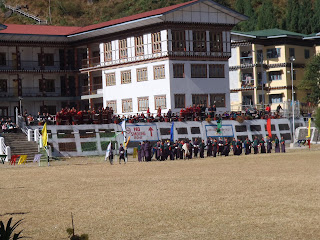I have been saying goodbye for two weeks and am now on the plane to Bangkok.
Dawa Dem called me as I was taxiing to the runway, for about the fifth time in two days. I almost had tears, but the last few days have been so wonderfully fulfilling and peaceful that I am content. It was moving to fly away from the great snowcapped peaks of the Himalaya. Yes I saw Jomolhari. Kanchenjunga and Everest.
Transitions were marked by the contrasts between the world of the Bhutanese, that I stepped into for a year, and the world I am returning to. Exaggerated by my stay in fancy hotels with my sister. It was a fantastic way to ease my leaving.
The day I visited Palden's house the contrast seemed rude to me. I felt overly privileged and warm. Even though the interior of the traditional home was warmed by a wood fire and body heat, I felt the chill of the mountain air through my pampered bones. I invited Palden and Chencho to dinner at the Gangtey Palace, a local historical building where they had never stepped foot. I knew they would be uncomfortable, but we talked about it and how I wanted them to see my world too. The hot shower, the warm luxurious room and the meal. They felt odd not bringing anything to dinner as Bhutanese always bring something for the host. It was really fun and they both enjoyed it. It was the deepest feeling of goodbye yet as I watched them walk away. I do not think the image will leave me.
 Luckily I knew I would see Chencho after Christmas. She invited me to her family's village up the mountain. Her cousin drove me to the end of the farm road, then she, her brother and I walked up for another hour. The village is mostly in ruin. There are two standing houses and a new Lakhang is being built about a kilometre from her home. The traditional house was left empty for a number of years. Urbanization. Her parents built a home in the valley in order to make it easier for the younger children to attend school. Once the oldest siblings were established and the younger ones could live with them, her parents returned to the property on the mountain. Other homes had been emptied, abandoned and fallen to ruin. Theirs had been padlocked. Unfortunately thieves and vandals had gone to work. The canvas paintings of the altar were stripped off the walls, the floorboards torn up and everything that could be carried had been taken away. At the same time her parents were moving up the mountain, the earthquake hit and damaged the home. Her father is an established carpenter and home builder and wanted to take the old house down and build another one. However the astrologer told them it was too important a home and had to be left standing so everyone could come there for the annual puja to be blessed. They are slowly reconstructing the building, but currently can only use two rooms. Her father has built temporary sheds in case of another earthquake.
Luckily I knew I would see Chencho after Christmas. She invited me to her family's village up the mountain. Her cousin drove me to the end of the farm road, then she, her brother and I walked up for another hour. The village is mostly in ruin. There are two standing houses and a new Lakhang is being built about a kilometre from her home. The traditional house was left empty for a number of years. Urbanization. Her parents built a home in the valley in order to make it easier for the younger children to attend school. Once the oldest siblings were established and the younger ones could live with them, her parents returned to the property on the mountain. Other homes had been emptied, abandoned and fallen to ruin. Theirs had been padlocked. Unfortunately thieves and vandals had gone to work. The canvas paintings of the altar were stripped off the walls, the floorboards torn up and everything that could be carried had been taken away. At the same time her parents were moving up the mountain, the earthquake hit and damaged the home. Her father is an established carpenter and home builder and wanted to take the old house down and build another one. However the astrologer told them it was too important a home and had to be left standing so everyone could come there for the annual puja to be blessed. They are slowly reconstructing the building, but currently can only use two rooms. Her father has built temporary sheds in case of another earthquake.

As we were walking I asked Chencho what she had been doing up there since school finished. “Basking in the sun, finding peace.” It was the most peaceful place I have spent time during my year in Bhutan. The view out one window is Jomolhari, out the opposite side Chelila Pass. The front window overlooks the Paro valley and the airport looks like a miniature
 |
| hot stones |
 |
| hot stone into the bath |
representation of urban development. I had a hot stone bath, drank copious amounts of tea, walked to the two closest Lakhangs and played with the nieces. Moments in my life that could have been a day or a year on the calendar. The walk down to modern life took about two hours and ended in Chencho's “town” house with . . . more tea.
 |
| looking back up at the house |
















































